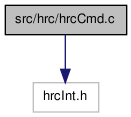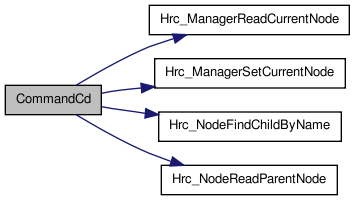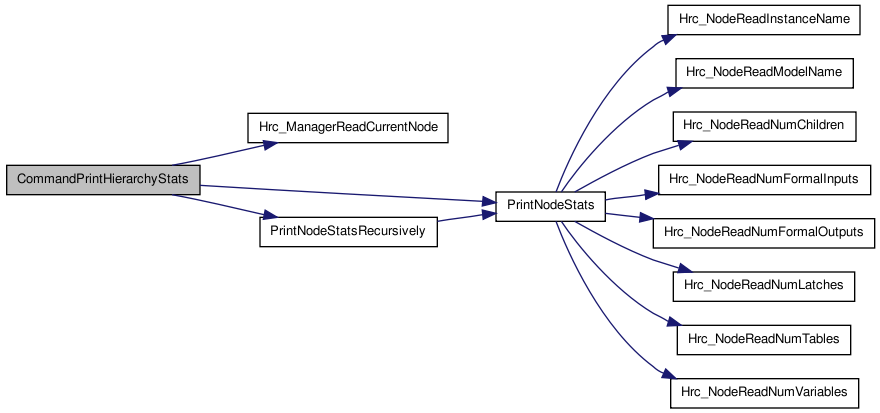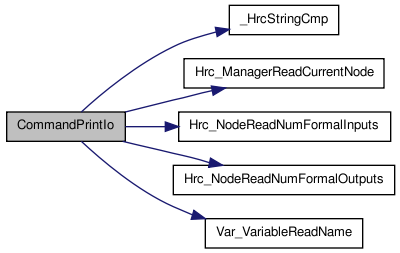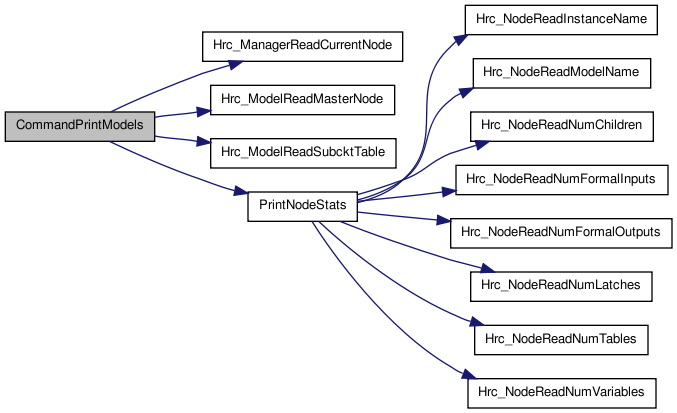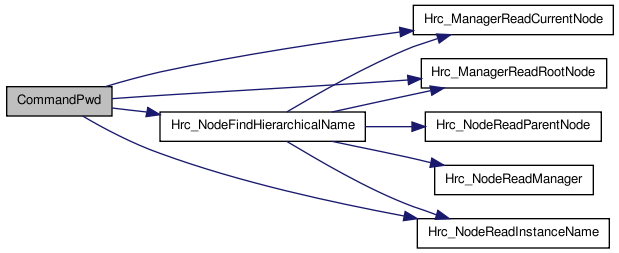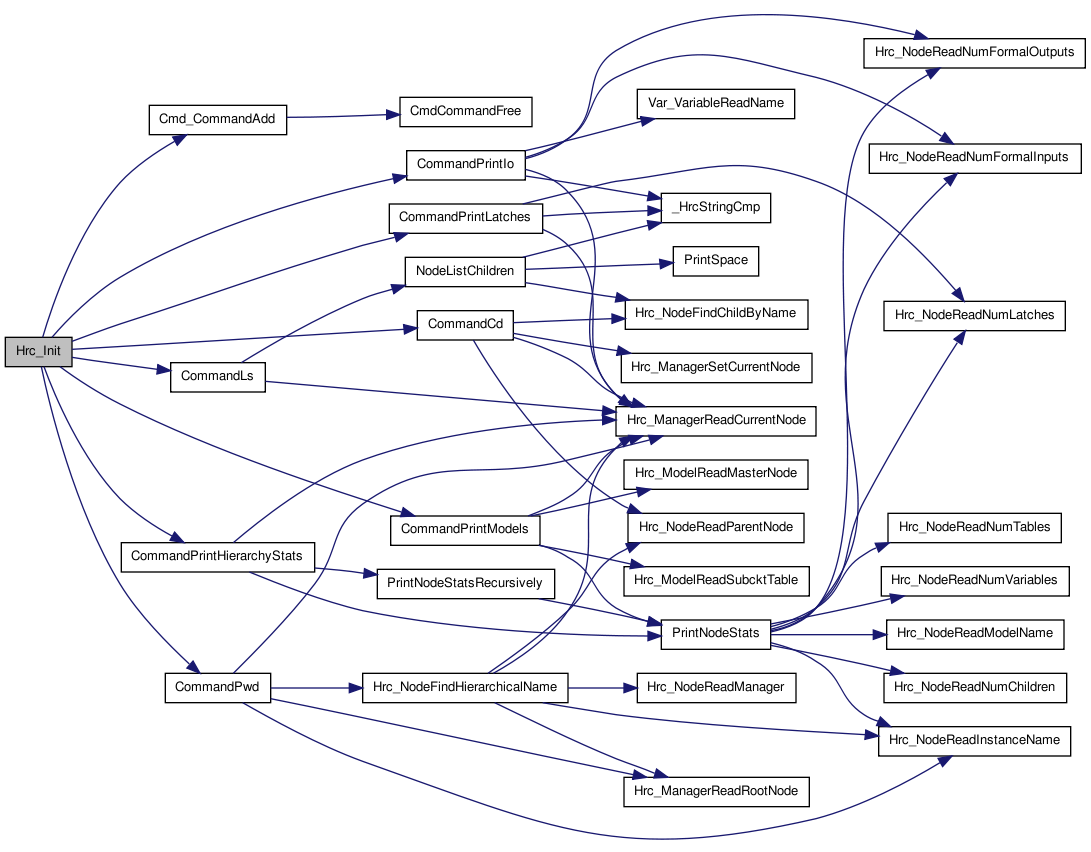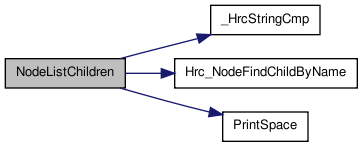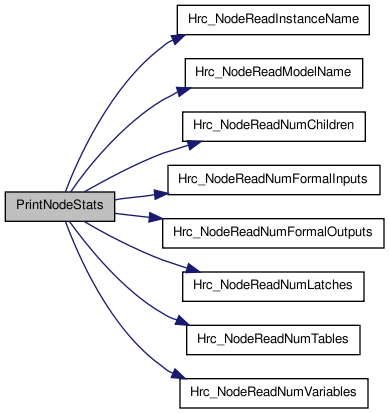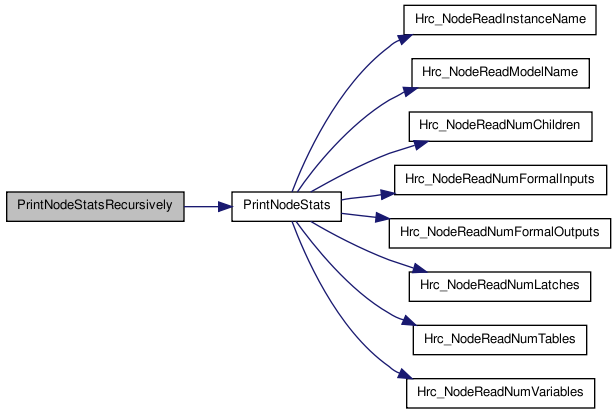#include "hrcInt.h" Include dependency graph for hrcCmd.c:
Include dependency graph for hrcCmd.c:Go to the source code of this file.
Functions | |
| static int | CommandCd (Hrc_Manager_t **hmgr, int argc, char **argv) |
| static int | CommandLs (Hrc_Manager_t **hmgr, int argc, char **argv) |
| static int | CommandPwd (Hrc_Manager_t **hmgr, int argc, char **argv) |
| static void | NodeListChildren (Hrc_Node_t *hnode, boolean recursiveFlag, int depth) |
| static void | PrintSpace (int depth) |
| static int | CommandPrintModels (Hrc_Manager_t **hmgr, int argc, char **argv) |
| static int | CommandPrintHierarchyStats (Hrc_Manager_t **hmgr, int argc, char **argv) |
| static void | PrintNodeStats (Hrc_Node_t *node, boolean isHnode) |
| static void | PrintNodeStatsRecursively (Hrc_Node_t *node) |
| static int | CommandPrintIo (Hrc_Manager_t **hmgr, int argc, char **argv) |
| static int | CommandPrintLatches (Hrc_Manager_t **hmgr, int argc, char **argv) |
| static int | _HrcStringCmp (const void *s1, const void *s2) |
| void | Hrc_Init (void) |
| void | Hrc_End (void) |
Variables | |
| static char rcsid[] | UNUSED = "$Id: hrcCmd.c,v 1.6 2002/09/08 21:54:25 fabio Exp $" |
Function Documentation
| static int _HrcStringCmp | ( | const void * | s1, |
| const void * | s2 | ||
| ) | [static] |
Function********************************************************************
Synopsis [This function is used for string comparison in array_sort.]
Description [This function is used for string comparison in array_sort.]
SideEffects []
SeeAlso []
Definition at line 806 of file hrcCmd.c.
{
return(strcmp(*(char **)s1, *(char **)s2));
}
 Here is the caller graph for this function:
Here is the caller graph for this function:| static int CommandCd | ( | Hrc_Manager_t ** | hmgr, |
| int | argc, | ||
| char ** | argv | ||
| ) | [static] |
AutomaticStart
Function********************************************************************
Synopsis [The top-level routine for cd.]
SideEffects []
CommandName [cd]
CommandSynopsis [change the current node]
CommandArguments [ \[-h\] <child_instance_name> or <..>]
CommandDescription [Changes the current node in the existing hierarchy. The argument should be either the name of a child node or .. meaning the parent node. Note that cd ../foo is not allowed.
Command options:
- -h
Print the command usage.
]
SeeAlso []
Definition at line 163 of file hrcCmd.c.
{
Hrc_Node_t *currentNode, *parent, *child;
int c;
util_getopt_reset();
while ((c = util_getopt(argc, argv, "h")) != EOF) {
switch(c){
case 'h':
goto usage;
default:
goto usage;
}
}
if (argc != 2){
goto usage;
}
currentNode = Hrc_ManagerReadCurrentNode(*hmgr);
if (currentNode == NIL(Hrc_Node_t)){
(void)fprintf(vis_stdout,"No file has been read in.\n");
return 1;
}
/* go to the parent node */
if (strcmp(*(++argv),"..") == 0){
if ((parent = Hrc_NodeReadParentNode(currentNode)) == NIL(Hrc_Node_t)){
(void)fprintf(vis_stderr,"You are at the root node. Can't cd to a parent.\n");
return 1;
}
Hrc_ManagerSetCurrentNode(*hmgr,parent);
return 0;
}
if ((child = Hrc_NodeFindChildByName(currentNode,*argv)) == NIL(Hrc_Node_t)){
(void)fprintf(vis_stderr,"No child node whose name is %s exists in the current node.\n",*argv);
return 1;
}
Hrc_ManagerSetCurrentNode(*hmgr,child);
return 0;
usage:
(void)fprintf(vis_stderr,"usage: cd [-h] child_name or cd ..\n");
(void) fprintf(vis_stderr, " -h \t\tprint the command usage\n");
return 1;
}
 Here is the call graph for this function:
Here is the call graph for this function: Here is the caller graph for this function:
Here is the caller graph for this function:| static int CommandLs | ( | Hrc_Manager_t ** | hmgr, |
| int | argc, | ||
| char ** | argv | ||
| ) | [static] |
Function********************************************************************
Synopsis [The top-level routine for ls.]
SideEffects []
CommandName [ls]
CommandSynopsis [list all the child nodes at the current node]
CommandArguments [\[-h\] \[-R\]]
CommandDescription [Lists all the child nodes at the current node.
Command options:
- -h
Print the command usage.
- -R
- Call ls recursively all the way down to leaves.
]
SeeAlso []
Definition at line 241 of file hrcCmd.c.
{
int recursiveFlag = 0;
int c;
Hrc_Node_t *currentNode;
util_getopt_reset();
while ((c = util_getopt(argc, argv, "hR")) != EOF) {
switch(c){
case 'h':
goto usage;
case 'R':
recursiveFlag = 1;
break;
default:
goto usage;
}
}
/* if there are some arguments for ls */
if (argc != util_optind){
goto usage;
}
currentNode = Hrc_ManagerReadCurrentNode(*hmgr);
if (currentNode == NIL(Hrc_Node_t)){
(void)fprintf(vis_stdout,"No file has been read in.\n");
return 1;
}
NodeListChildren(currentNode, recursiveFlag, 0);
return 0;
usage:
(void)fprintf(vis_stderr,"usage: ls [-h] [-R]\n");
(void) fprintf(vis_stderr, " -h \t\tprint the command usage\n");
(void) fprintf(vis_stderr, " -R \t\tprint recursive tree\n");
return 1;
}
 Here is the call graph for this function:
Here is the call graph for this function: Here is the caller graph for this function:
Here is the caller graph for this function:| static int CommandPrintHierarchyStats | ( | Hrc_Manager_t ** | hmgr, |
| int | argc, | ||
| char ** | argv | ||
| ) | [static] |
Function********************************************************************
Synopsis [This function prints the statistics of the hierarchy.]
SideEffects []
CommandName [print_hierarchy_stats]
CommandSynopsis [print the statistics of the current node]
CommandArguments [ \[-h\] \[-R\] ]
CommandDescription [Prints the statistics of the current node. Note that it is not necessary to invoke flatten_hierarchy first to create a network.
Command options:
- -h
Print the command usage
- -R
Print statistics for nodes recursively all the way down to leaves.
]
SeeAlso []
Definition at line 515 of file hrcCmd.c.
{
int c;
int recursiveFlag = 0;
Hrc_Node_t *node;
util_getopt_reset();
while ((c = util_getopt(argc, argv, "hR")) != EOF) {
switch(c){
case 'h':
goto usage;
case 'R':
recursiveFlag = 1;
break;
default:
goto usage;
}
}
/* if there are some arguments left */
if (argc != util_optind){
goto usage;
}
node = Hrc_ManagerReadCurrentNode(*hmgr);
if (node == NIL(Hrc_Node_t)){
(void)fprintf(vis_stderr,"No file has been read in.\n");
return 1;
}
if(recursiveFlag) {
PrintNodeStatsRecursively(node);
}
else {
PrintNodeStats(node, TRUE);
}
return 0;
usage:
(void) fprintf(vis_stderr,"usage: print_hierarchy_stats [-h][-R]\n");
(void) fprintf(vis_stderr, " -h \t\tprint the command usage\n");
(void) fprintf(vis_stderr, " -R \t\tprint recursive tree\n");
return 1;
}
 Here is the call graph for this function:
Here is the call graph for this function: Here is the caller graph for this function:
Here is the caller graph for this function:| static int CommandPrintIo | ( | Hrc_Manager_t ** | hmgr, |
| int | argc, | ||
| char ** | argv | ||
| ) | [static] |
Function********************************************************************
Synopsis [This function prints the names of inputs/outputs in the current node.]
SideEffects []
CommandName [print_io]
CommandSynopsis [print the names of inputs/outputs in the current node]
CommandArguments [ \[-h\] ]
CommandDescription [Prints the names of inputs/outputs in the current node.
Command options:
- -h
- Print the command usage.
]
SeeAlso []
Definition at line 645 of file hrcCmd.c.
{
int c, i;
Hrc_Node_t *node;
Var_Variable_t *var;
array_t *tmpArray;
util_getopt_reset();
while ((c = util_getopt(argc, argv, "h")) != EOF) {
switch(c){
case 'h':
goto usage;
default:
goto usage;
}
}
/* if there are some arguments left */
if (argc != util_optind){
goto usage;
}
node = Hrc_ManagerReadCurrentNode(*hmgr);
if (node == NIL(Hrc_Node_t)){
(void)fprintf(vis_stderr,"No file has been read in.\n");
return 1;
}
if (Hrc_NodeReadNumFormalInputs(node) == 0){
fprintf(vis_stdout,"No inputs\n");
}
else {
tmpArray = array_alloc(char *,0);
Hrc_NodeForEachFormalInput(node,i,var){
array_insert_last(char *,tmpArray,Var_VariableReadName(var));
}
array_sort(tmpArray,_HrcStringCmp);
fprintf(vis_stdout,"inputs:");
for (i=0; i < array_n(tmpArray); i++){
fprintf(vis_stdout," %s",array_fetch(char *,tmpArray,i));
}
fprintf(vis_stdout,"\n");
array_free(tmpArray);
}
if (Hrc_NodeReadNumFormalOutputs(node) == 0){
fprintf(vis_stdout,"No outputs\n");
}
else {
tmpArray = array_alloc(char *,0);
Hrc_NodeForEachFormalOutput(node,i,var){
array_insert_last(char *,tmpArray,Var_VariableReadName(var));
}
array_sort(tmpArray,_HrcStringCmp);
fprintf(vis_stdout,"outputs:");
for (i=0; i < array_n(tmpArray); i++){
fprintf(vis_stdout," %s",array_fetch(char *,tmpArray,i));
}
fprintf(vis_stdout,"\n");
array_free(tmpArray);
}
return 0;
usage:
(void) fprintf(vis_stderr,"usage: print_io [-h]\n");
(void) fprintf(vis_stderr, " -h \t\tprint the command usage\n");
return 1;
}
 Here is the call graph for this function:
Here is the call graph for this function: Here is the caller graph for this function:
Here is the caller graph for this function:| static int CommandPrintLatches | ( | Hrc_Manager_t ** | hmgr, |
| int | argc, | ||
| char ** | argv | ||
| ) | [static] |
Function********************************************************************
Synopsis [This function prints the names of latches in the current node.]
SideEffects []
CommandName [print_latches]
CommandSynopsis [print the names of latches in the current node]
CommandArguments [ \[-h\] ]
CommandDescription [Prints the names of latches in the current node.
Command options:
- -h
- Print the command usage.
]
SeeAlso []
Definition at line 740 of file hrcCmd.c.
{
int c, i;
Hrc_Node_t *node;
st_generator *gen;
char *latchName;
Hrc_Latch_t *latch;
array_t *tmpArray;
util_getopt_reset();
while ((c = util_getopt(argc, argv, "h")) != EOF) {
switch(c){
case 'h':
goto usage;
default:
goto usage;
}
}
/* if there are some arguments left */
if (argc != util_optind){
goto usage;
}
node = Hrc_ManagerReadCurrentNode(*hmgr);
if (node == NIL(Hrc_Node_t)){
(void)fprintf(vis_stderr,"No file has been read in.\n");
return 1;
}
if (Hrc_NodeReadNumLatches(node) == 0){
fprintf(vis_stdout,"No latches\n");
}
else {
tmpArray = array_alloc(char *,0);
Hrc_NodeForEachLatch(node,gen,latchName,latch){
array_insert_last(char *,tmpArray,latchName);
}
array_sort(tmpArray,_HrcStringCmp);
for (i=0; i < array_n(tmpArray); i++){
fprintf(vis_stdout,"%s ",array_fetch(char *,tmpArray,i));
}
fprintf(vis_stdout,"\n");
array_free(tmpArray);
}
return 0;
usage:
(void) fprintf(vis_stderr,"usage: print_latches [-h]\n");
(void) fprintf(vis_stderr, " -h \t\tprint the command usage\n");
return 1;
}
 Here is the call graph for this function:
Here is the call graph for this function: Here is the caller graph for this function:
Here is the caller graph for this function:| static int CommandPrintModels | ( | Hrc_Manager_t ** | hmgr, |
| int | argc, | ||
| char ** | argv | ||
| ) | [static] |
Function********************************************************************
Synopsis [This function the statistics of a model.]
SideEffects []
CommandName [print_models]
CommandSynopsis [list all the models and their statistics]
CommandArguments [ \[-h\] ]
CommandDescription [Lists all the models and prints information about the number of variables, tables, latches etc. in them.
Command options:
- -h
Print the command usage.
]
SeeAlso []
Definition at line 442 of file hrcCmd.c.
{
st_generator *gen;
char *name;
Hrc_Model_t *model;
Hrc_Node_t *node;
int c;
util_getopt_reset();
while ((c = util_getopt(argc, argv, "h")) != EOF) {
switch(c){
case 'h':
goto usage;
default:
goto usage;
}
}
if(argc != 1) {
goto usage;
}
node = Hrc_ManagerReadCurrentNode(*hmgr);
if (node == NIL(Hrc_Node_t)){
(void)fprintf(vis_stderr,"No file has been read in.\n");
return 1;
}
Hrc_ManagerForEachModel(*hmgr, gen, name, model) {
PrintNodeStats(Hrc_ModelReadMasterNode(model), FALSE);
(void) fprintf(vis_stdout, "subckts = %d\n",
st_count(Hrc_ModelReadSubcktTable(model)));
}
return 0;
usage:
(void) fprintf(vis_stderr, "usage: print_models [-h]\n");
(void) fprintf(vis_stderr, " -h \t\tprint the command usage\n");
return 1;
}
 Here is the call graph for this function:
Here is the call graph for this function: Here is the caller graph for this function:
Here is the caller graph for this function:| static int CommandPwd | ( | Hrc_Manager_t ** | hmgr, |
| int | argc, | ||
| char ** | argv | ||
| ) | [static] |
Function********************************************************************
Synopsis [The top-level routine for pwd.]
SideEffects []
CommandName [pwd]
CommandSynopsis [print out the full path of the current node from the root node]
CommandArguments [ \[-h\] ]
CommandDescription [Prints out the full path of the current node from the root node.
Command options:
- -h
Print the command usage.
]
SeeAlso []
Definition at line 312 of file hrcCmd.c.
{
Hrc_Node_t *currentNode;
Hrc_Node_t *rootNode;
char *separator, *hierarchicalName;
int c;
util_getopt_reset();
while ((c = util_getopt(argc, argv, "h")) != EOF) {
switch(c){
case 'h':
goto usage;
default:
goto usage;
}
}
if (argc != 1){
goto usage;
}
currentNode = Hrc_ManagerReadCurrentNode(*hmgr);
if (currentNode == NIL(Hrc_Node_t)){
(void)fprintf(vis_stdout,"No file has been read in.\n");
return 1;
}
rootNode = Hrc_ManagerReadRootNode(*hmgr);
separator = (char *) ((rootNode == currentNode) ? "" : ".");
hierarchicalName = Hrc_NodeFindHierarchicalName(currentNode, FALSE);
(void)fprintf(vis_stdout,"%s%s%s\n", Hrc_NodeReadInstanceName(rootNode),
separator, hierarchicalName);
FREE(hierarchicalName);
return 0;
usage:
(void)fprintf(vis_stderr,"usage: pwd [-h]\n");
(void) fprintf(vis_stderr, " -h \t\tprint the command usage\n");
return 1;
}
 Here is the call graph for this function:
Here is the call graph for this function: Here is the caller graph for this function:
Here is the caller graph for this function:| void Hrc_End | ( | void | ) |
| void Hrc_Init | ( | void | ) |
AutomaticEnd Function********************************************************************
Synopsis [Initializes the hrc package.]
SideEffects []
SeeAlso [Hrc_End]
Definition at line 101 of file hrcCmd.c.
{
Cmd_CommandAdd("cd", CommandCd, 0);
Cmd_CommandAdd("ls", CommandLs, 0);
Cmd_CommandAdd("pwd", CommandPwd, 0);
Cmd_CommandAdd("print_models", CommandPrintModels, 0);
Cmd_CommandAdd("print_hierarchy_stats", CommandPrintHierarchyStats, 0);
Cmd_CommandAdd("print_io", CommandPrintIo, 0);
Cmd_CommandAdd("print_latches", CommandPrintLatches, 0);
}
 Here is the call graph for this function:
Here is the call graph for this function: Here is the caller graph for this function:
Here is the caller graph for this function:| static void NodeListChildren | ( | Hrc_Node_t * | hnode, |
| boolean | recursiveFlag, | ||
| int | depth | ||
| ) | [static] |
Function********************************************************************
Synopsis [The core routine for the command ls.]
Description [The core routine for the command ls. If the second argument is set to 1, it calls the ls routine recursively all the way down to leaves.]
SideEffects []
SeeAlso []
Definition at line 367 of file hrcCmd.c.
{
st_generator *gen;
char *childName;
Hrc_Node_t *child;
int newDepth, i;
array_t *tmpArray;
newDepth = depth + 1;
tmpArray = array_alloc(char *,0);
Hrc_NodeForEachChild(hnode,gen,childName,child){
array_insert_last(char *,tmpArray,childName);
}
array_sort(tmpArray,_HrcStringCmp);
for (i=0; i < array_n(tmpArray); i++){
PrintSpace(depth);
childName = array_fetch(char *,tmpArray,i);
(void)fprintf(vis_stdout,"%s\n",childName);
if (recursiveFlag == 1){
NodeListChildren(Hrc_NodeFindChildByName(hnode,childName),recursiveFlag,newDepth);
}
}
array_free(tmpArray);
}
 Here is the call graph for this function:
Here is the call graph for this function: Here is the caller graph for this function:
Here is the caller graph for this function:| static void PrintNodeStats | ( | Hrc_Node_t * | node, |
| boolean | isHnode | ||
| ) | [static] |
Function********************************************************************
Synopsis [This function prints the statistics of a node.]
SideEffects []
SeeAlso []
Definition at line 571 of file hrcCmd.c.
{
(void) fprintf(vis_stdout, "Model name = %s", Hrc_NodeReadModelName(node));
if(isHnode) {
(void) fprintf(vis_stdout, ", Instance name = %s\n",
Hrc_NodeReadInstanceName(node));
}
else {
(void) fprintf(vis_stdout, "\n");
}
(void) fprintf(vis_stdout, "inputs = %d,", Hrc_NodeReadNumFormalInputs(node));
(void) fprintf(vis_stdout, " outputs = %d,", Hrc_NodeReadNumFormalOutputs(node));
(void) fprintf(vis_stdout, " variables = %d,", Hrc_NodeReadNumVariables(node));
(void) fprintf(vis_stdout, " tables = %d,", Hrc_NodeReadNumTables(node));
(void) fprintf(vis_stdout, " latches = %d", Hrc_NodeReadNumLatches(node));
if(isHnode) {
(void) fprintf(vis_stdout, ", children = %d\n", Hrc_NodeReadNumChildren(node));
}
else {
(void) fprintf(vis_stdout, "\n");
}
}
 Here is the call graph for this function:
Here is the call graph for this function: Here is the caller graph for this function:
Here is the caller graph for this function:| static void PrintNodeStatsRecursively | ( | Hrc_Node_t * | node | ) | [static] |
Function********************************************************************
Synopsis [This function prints the statistics of each node in the subtree rooted at node. ]
SideEffects []
SeeAlso []
Definition at line 607 of file hrcCmd.c.
{
Hrc_Node_t *childNode;
st_generator *gen;
char *name;
PrintNodeStats(node, TRUE);
Hrc_NodeForEachChild(node, gen, name, childNode) {
PrintNodeStatsRecursively(childNode);
}
}
 Here is the call graph for this function:
Here is the call graph for this function: Here is the caller graph for this function:
Here is the caller graph for this function:| static void PrintSpace | ( | int | depth | ) | [static] |
Function********************************************************************
Synopsis [Prints out spaces.]
SideEffects []
SeeAlso []
Definition at line 406 of file hrcCmd.c.
{
int i;
for (i=0; i < depth; i++){
(void)fprintf(vis_stdout," ");
}
}
 Here is the caller graph for this function:
Here is the caller graph for this function:Variable Documentation
char rcsid [] UNUSED = "$Id: hrcCmd.c,v 1.6 2002/09/08 21:54:25 fabio Exp $" [static] |
CFile***********************************************************************
FileName [hrcCmd.c]
PackageName [hrc]
Synopsis [Commands for walking around HSIS/VIS hierarchies.]
Description []
SeeAlso []
Author [Yuji Kukimoto]
Copyright [Copyright (c) 1994-1996 The Regents of the Univ. of California. All rights reserved.
Permission is hereby granted, without written agreement and without license or royalty fees, to use, copy, modify, and distribute this software and its documentation for any purpose, provided that the above copyright notice and the following two paragraphs appear in all copies of this software.
IN NO EVENT SHALL THE UNIVERSITY OF CALIFORNIA BE LIABLE TO ANY PARTY FOR DIRECT, INDIRECT, SPECIAL, INCIDENTAL, OR CONSEQUENTIAL DAMAGES ARISING OUT OF THE USE OF THIS SOFTWARE AND ITS DOCUMENTATION, EVEN IF THE UNIVERSITY OF CALIFORNIA HAS BEEN ADVISED OF THE POSSIBILITY OF SUCH DAMAGE.
THE UNIVERSITY OF CALIFORNIA SPECIFICALLY DISCLAIMS ANY WARRANTIES, INCLUDING, BUT NOT LIMITED TO, THE IMPLIED WARRANTIES OF MERCHANTABILITY AND FITNESS FOR A PARTICULAR PURPOSE. THE SOFTWARE PROVIDED HEREUNDER IS ON AN "AS IS" BASIS, AND THE UNIVERSITY OF CALIFORNIA HAS NO OBLIGATION TO PROVIDE MAINTENANCE, SUPPORT, UPDATES, ENHANCEMENTS, OR MODIFICATIONS.]
